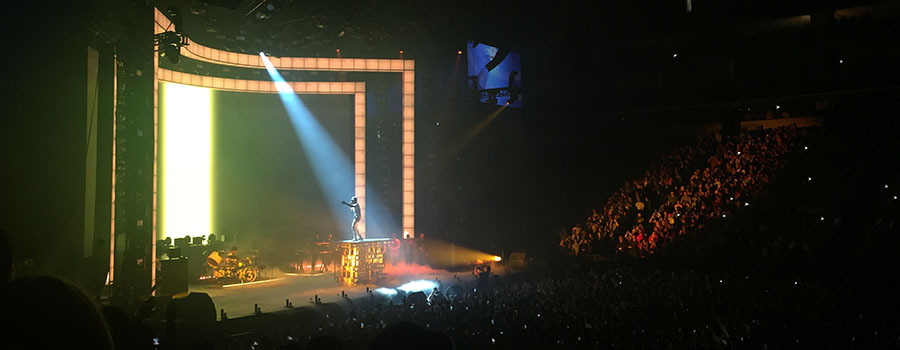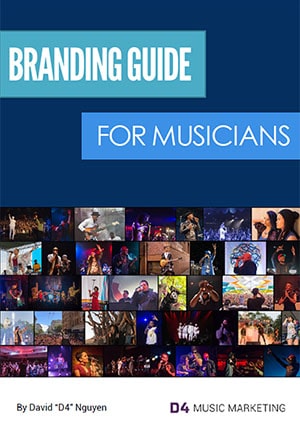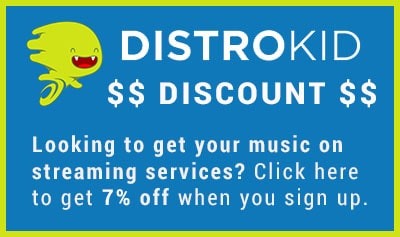
Whether or not you are a fan of hip hop, I’m sure you’ve probably heard or seen the name Chance the Rapper before.
I had the chance to see Chance the Rapper live here in Sacramento recently on April 27, 2017. Although I can’t say I’m a huge fan, he does make great music and a down-to-earth guy you want to root for.
Those who have read a few of my previous blogs know that I have referenced Chance a few times as the poster child for this paradigm shift that music should be freely accessible. Embracing this shift is a mindset and approach I believe will be critical to the future success of all musicians. Offering your music without a price tag and knowing that the days of records sales are dying so all musicians need to start adopting now.
Obviously he’s not the first person to offer his music for free, but he has been getting a lot of attention for it in the past because of everything he’s accomplished so far in his young career as an independent.
With all of Chance’s success, I think artists and musicians are curious to know what they can do to improve their chances of making it like he did. I don’t have much experience in the music industry yet to know exactly what it takes. But as a music fan who understands sociology, psychology and marketing, what I can tell you is that success doesn’t come from talent and hard work alone.
Chance the Rapper has demonstrated that the key to success is that there isn’t one key. In my opinion, reaching his level of success in music depends on a number of key factors and variables.
After watching him closely and seeing him live recently, here’s my list of 7 primary principles/factors I feel contributed to his massive success as in an independent that I feel other artists and musicians can learn from and apply.
Who is Chance the Rapper?
For those who don’t know, Chance the Rapper is a 24-year-old high school drop out from Chicago who has become one of the hottest rappers since blowing up in 2016.
What makes him special is that not only is he making history as an independent artist, but doing so by challenging the current music industry paradigm and dispelling the “traditional” way of how artists typically make it in the music business. He has achieved superstar status without having sold a single record, putting out physical releases and any label support.
Here’s what he’s done so far in his young career:
- Nominated for 7 Grammys and won 3 in 2017 (Best New Artist, Best Rap Performance, Best Rap Album)
- Became the first unsigned artist to perform on Saturday Night Live (December 15, 2015).
- His third mixtape release, Coloring Book, in 2016 was the first streaming-only album to ever receive and win a Grammy nomination.
- Coloring Book was the first streaming-exclusive album to chart on Billboard 200 (Debuted at number 8)
- Grew his social media following: Facebook (1.7 million), Twitter (3.79 million), Instagram (4.8 million), Soundcloud (1.5 million), Youtube (782k)
- Continues to sell out merch and tour dates (http://chanceraps.com/)
- Wrote parts of 5 songs on his idol Kanye West’s The Life of Pablo album.
1. Hard Work + Persistence + Patience = Groundwork for Success
As cliché and obvious as it is, I think it’s important to start off by saying you need to work hard and be patient if you want to make it as an independent artist. From my perspective as a music fan, it can take at least 5 – 15 years to really pick up steam and build a sustainable career in music. I would say Chance is the exception by being on the shorter of my estimation.
Chance wasn’t just “lucky” either. He made all the right moves leading to his breakout and laid the proper groundwork that lead to his success. Along with the music, he was known earlier on for being a very energetic performer, or as his manager said “Chance turnt the fuck up every night.” Because of that, people really wanted to see his shows.
I don’t know all the specifics of how many hours he put in, but I imagine it’s the standard hustle that we all need to put forth if we want to accomplish our goals. It should go without saying, but I don’t think it hurts to remind. One things for sure, he was really involved with music in his school and community. Chance participated in an after-school program called YOUmedia and at an open-mic venue called Young Chicago Authors.
The other component to hard work is having a goal, sound strategy and game plan to execute. After all, it’s certainly possible do a lot of hard work that does not contribute to what you want to accomplish as an artist.
2. MGM – Make good music.
Making good music is another obvious factor in Chance’s popularity, but notice how I didn’t say talent. Some might say talent is a huge factor (maybe the biggest), and I acknowledge that it is important.
While it’s clear that Chance the Rapper has immense talent, in the same token, pure talent is not the primary factor to making it in the music business. I’m a firm believer that talent, most of the time, is not something that is innate or a skill you are genetically predisposed to be good at. It’s something that can be learned, developed and harnessed over time through practice, persistence and patience, especially when starting at a young age.
At the end of the day, it’s the byproduct of that talent and creativity that really matters – good songs and music. It’s the X-factor of what allows artists to rise to the top and garner attention. Talent needs to be able to translate into tangible creative outputs that resonate with people. After all, how many of us really follow anyone who can only sing or rap really well but not put out any good music?
I don’t make music or have any musical talents myself, but I know that all the artists and musicians we love don’t hit home runs every single time. There’s trial and error involved too.
If you want a sustainable career in music, you must be self-aware and honest enough with yourself to know if what you’re making is actually good or not while be able to learn from the criticism. At the same time, you also need to have the persistence to keep putting your music out there when your songs don’t take off as you hoped.
3. Music accessibility over ownership. Streaming is the future.
When I was at the Chance concert, one thing that really stood out to me was how young his fan base is… also that they really love to smoke weed. I swear the average age felt like it was 18 years old, but was probably closer to 24 or 25.
Age is worth noting because of the trend with music streaming, which so happens to be more popular with Millennials and the Hip Hop / R&B genre. It only makes sense that the Chance the Rapper fan base reflects the demographic that is streaming music the most. Although musicians and artists are upset that the value of music has been on the decline, this idea of music being free is not a fad – it’s where the future is headed, Chance and his fans have embraced this change.
“Paid audio streaming services are growing in popularity, especially among under 25s. One-third of 16-24 year olds now pay for an audio streaming service.” – IFPI Music Consumer Report 2016
Chance the Rapper made all his music releases for free under the label of a “mixtape.” By doing this, he removed any barriers to access and discover his music so it’s easier to spread through the masses. (Update: To be fair, I later learned they he did try to sell a song (Juice from Acid Rap) earlier in his career, but it was taken down for sale shortly after. The song had a sample that didn’t clear and they didn’t want to be sued.)
He was ahead of the game. Having your music free to download is a marketing strategy that will be the norm as younger music listeners become accustomed to it and expect it. This doesn’t mean you still can’t sell physical copies of your record, but you may want to reevaluate how you distribute your music.
4. Be honest. Be humble. Be yourself.
One of the most captivating qualities about Chance the Rapper is how genuine and humble he is. He reiterated during a few moments in the show that he was a regular dude just like everyone else here. At one point, while staring into the crowd, he got emotional as he was going to tear up in amazement that so many people would come out to see him. To me, being honest and humble makes him so much more relatable and easier to connect with.
The other thing Chance the Rapper proves is you can make it being your true authentic self. Let’s be real, with the hat and overalls, I know I’m not the only one who thinks he looks like a Super Mario brother! He doesn’t really look like your typical mainstream “rapper.” Yet, people still love and embrace him for exactly who he is.
The great thing about music in the digital age is that there’s a market and niche for just about every sub-genre and category. You don’t need to fake the funk and cater to what is currently hot to make it. Stay true to yourself and speak your truth. Authenticity wins. There are so many angles and markets you can hone in on, which leads to the next point.
5. Focus on a niche. Build your brand.
The most obvious side of his brand is his faith in Christianity. Although he’s not branded as a ‘Christian rapper’ or artist, it definitely has a presence in his brand as there’s a strong influence of Gospel music in his songs and lyrics. As you would imagine, there was some subtle Christian symbolism on the stage for his show, but nothing too obvious like crosses. In other words, he’s found the right branding mix that works for him.
For Chance, his strong, consistent branding is one of the main reasons he’s been able to achieve financial success without selling a single record. Branding sells. It’s what fuels demand for your merch sales and live shows.
When I got there and when I left his concert, I paid close attention to how long the merch lines were. It’s clear that he’s built a powerful brand that resonates with so many people.
Find the branding angle that is the most authentic to you and go all-in on it. Know what you stand for, what you represent and what your message is as a brand. Some may be turned off by the idea of being a “brand,” but you may be holding yourself back. Ultimately, your music and brand are the true differentiators that will help separate you in a very saturated music industry.
6. Be about the people, community and fans.
I believe that when you serve your fans and community as an artist, you win.
Music and art are ultimately about the people who consume it and are impacted by it. To me, a great artist is someone who acknowledges this. Chance the Rapper embodies this idea of selflessness.
Based on his donations and activities in the community, we also know that Chance is a big supporter of the arts and music programs in public schools. He donated $1 million to Chicago Public Schools to support arts and enrichment programming.
Here’s a Facebook Live video he did to make that announcement:
We know that he cares about social issues that are prevalent in Chicago and many other urban areas:
Lastly, he also did something I’ve never heard any other artist do – he fought back against scalpers who were trying to price gouge tickets to his show. As a result, he managed to buy back almost 2,000 tickets from these scalpers to his won festival, and resell them back to fans at fair prices.
That story was from his last tour in 2016. He also did this again for the tour I attended.
After winning his 3 Grammys, he announced that he was going on tour again. As you would imagine, it was a good opportunity for scalpers to capitalize at the height of the hype as tickets were selling out across the country. He then posted this on Facebook about how he was getting tickets back from scalpers:
As a community-oriented artist who supports the arts, Chance knows how to leverage his success and build his music legacy. Most artists reading this are probably not at the level to donate $1 million, but getting involved in the community doesn’t cost anything except your time. Not only does it feel good to help in general, I believe there are advantages to taking a community approach as an artist.
7. Build a team ASAP. It’s difficult to do it alone.
At a certain point in your career, you will need to build a team around you so that you can focus more on making music. The scarcest resource you have as an artist is your time, so you need to find every way possible to free up more of it.
Your money can be scarce too, but buying yourself time by paying and recruiting the right people on your team will ultimately provide more opportunities to make money by giving you the time to put out more music. Chance didn’t have any label support, but he did have right people in his corner early on.
It’s important to find people for your team who believe in what you do, share your vision and handle the right tasks. While still a teenager, Chance got a piece of advice from Childish Gambino.
“Donald Glover told me when I was, like, 19 to hire a business manager,” Chance explained.
This was early in his career before all the financial success. Most people reading this may already know they will need to build a team eventually, but it’s probably sooner than you think. The problem is not having the money and or knowing the right people to trust for your team. That’s why networking is so important. Start with your local community because you’ll never know who you may find that may have the specific skills you need, like website creation, promotion and artist management.
Chance’s manager Pat Corcoran is perfect example of this.
After studying to be a psychologist and dabbling in concert promotion, where he met Chance, Pat dropped out of college in 2012 to manage the rapper full time. “I’m going to work for Chance until we’re headlining festivals and winning Grammys — or until I get fired.” He wasn’t a big shot, expensive manager. He was a former promoter and blogger in the Chicago scene. There’s a great documentary type video by Complex that goes in depth with Pat Corcoran of the story how his relationship with Chance began and how they grew together to this point now. Very cool and inspiring video I highly recommend checking out.
As of August 2016, he has 32 people on his team including musicians, merchandise, video, booking and management.
The main point is if you’re serious about music and your career is picking up momentum, you need to prioritize building your team. This means really assessing what you’re spending your money on and investing any money you can towards your career by hiring the right people for your team. Also, get yourself out there and network because you might find trustworthy people who want to grow with you and be willing to do the job for the experience.
Conclusion
Not only is Chance the Rapper an amazing artist, he’s become a role model not only for his peers and community, but also for other musicians who want to be able to have the impact he has in the music industry.
Just make sure to keep your expectations in check as following all these principles does not guarantee success. Scientifically and mathematically speaking, there’s so many other variables involved (upbringing, life experiences, family environments, socioeconomic factors, perception, geography) to account for. This means that it’s really about how you navigate the music industry and handle situations you do have control over. But I do believe that if you implement those 7 principles together, you’ll have a much better chance of making it in this changing music landscape.
You can see clips and photos from my Chance the Rapper experience on my Instagram post:







